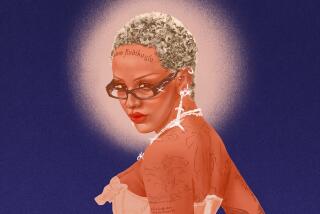Seeing the Enemy Within
- Share via
Sometimes all it takes is a father’s firm “No” to put his children in their proper place.
Rapper Chuck D often finds himself saying the word as his two young daughters pile candy into the cart while they’re shopping in his neighborhood grocery store on Long Island.
“I have to say, ‘Which part of ‘no’ do you not understand, the ‘n’ or the ‘o’?” says the man with rap’s most distinctive baritone.
The leader of Public Enemy, one of rap’s most acclaimed groups, asks his hip-hop brethren the same question this fall.
Like a father who’s returned to find the house in disarray, the 36-year-old rapper has written a list of admonishments and taped them on the hip-hop nation’s refrigerator door.
In “No,” the first single from his first solo album, “Autobiography of Mistachuck,” Chuck D lays out rap’s problems in no uncertain terms.
And in the wake of last month’s fatal shooting of Tupac Shakur, the timing seems right for rap’s Moses to descend from the mountain with some commandments for young rappers who, he believes, have started worshiping the false idols of gangsterism and capitalism. As he says in”No”:
No “girl I got the cash” raps,
No sex traps
No Rolexes
No unprotected sex
No false hopes
No car notes
No jail time
“It would be easy to ride the [gangsta rap] trend because it will push you forward in the marketplace,” Chuck D says of his decision to lay out rap’s problems in song. “Going against the musical grain with positivity is like trying to climb a mountain wearing roller skates. . . . I don’t always expect to win, but I do expect to be heard.”
Getting people to listen has never been a problem for Chuck D.
Public Enemy, which expanded both the political content and the sound of rap music, wowed critics, fans and peers starting in 1987 with its dynamic albums “Yo! Bum Rush the Show,” “It Takes a Nation of Millions to Hold Us Back,” “Fear of a Black Planet” and “Apocalypse 91 . . . the Enemy Strikes Black.” The albums all reached gold or platinum status, and the group garnered a worldwide following.
But Public Enemy’s last release, 1994’s “Muse Sick-N-Hour Mess Age,” was panned by critics and sold poorly despite heavy radio play and MTV video rotation. Many rap fans, caught up in the hard-core rapture of the Notorious B.I.G. and the Wu-Tang Clan, largely ignored the record.
But Chuck D doesn’t take that rebuff as an indication that Public Enemy is dead, despite his announcement a year ago that the group was going into “retirement” and the arrival this week of his solo album (see review, Page 86).
Chuck D is back at work with the group on its seventh album, “Afraid of the Dark,” which is scheduled to be released next summer. The album will reunite Chuck D with current PE members Flavor Flav and Terminator X, and will also bring original members Eric “Vietnam” Sadler, Hank Shocklee and Professor Griff--the rapper who stirred up a controversy in 1989 with anti-Semitic remarks--back into the fold. It marks the first time the original members of the Bomb Squad--the production wing of the Public Enemy enterprise--have been united since 1987’s “It Takes a Nation of Millions.”
The solo album, Chuck D explains, is a way for him to experiment with slower grooves and to take musical chances he might not take with Public Enemy. The subject matter, however, is exactly the same: black pride, education and self-control.
“This album is no indication of how the Public Enemy record will sound,” he says. “I never wanted to be judged as someone who did the same thing twice. With this record, I wanted to do something different, like grooves and some ol’ soulful stuff.”
“Autobiography of Mistachuck” aims the rapper toward young fans who may be navigating without guidance or role models. Songs such as “No,” “Generation Wrekkked” and “Free Big Willie” raise questions about the content of rap albums and attempt to turn the tide of rampant nihilism into a motivation for political action.
In the cut “But Can You Kill the Nigger in You?,” Chuck D uses the racial slur as an image of self-destructiveness.
“To me, a nigger is a bomb inside of every black person, a rebel without a cause who will eventually explode on himself,” Chuck D explains. “Once you have direction, you stop being a nigger and become a threat. That’s what I mean with the song. . . . It’s easy in our music to say, ‘Yeah, I’m going to kill that guy,’ but killing that ignorance inside of you, that’s the real challenge.”
So what does Shakur, a talented but conflict-riddled man who was unable to defuse his demons, teach listeners and peers by his tragic example?
“Tupac should teach all of us to plan, think and then execute,” Chuck D says somberly. “You can’t just be spontaneous when we are at war with the system and black males are systematically targeted.
“Tupac as an influence was more powerful than his money, but money is the tool that those with power use to sweep those who don’t have it under the rug. It’s up to [black executives such as] Russell Simmons, Andre Harrell and Sean ‘Puffy’ Combs to be more [politically] vocal.”
So where does Chuck D fit in the larger scheme of things?
“Ten years ago, I called rap music black America’s CNN,” Chuck D says. “My biggest concern now is keeping it from becoming the Cartoon Network.”
More to Read
The biggest entertainment stories
Get our big stories about Hollywood, film, television, music, arts, culture and more right in your inbox as soon as they publish.
You may occasionally receive promotional content from the Los Angeles Times.









